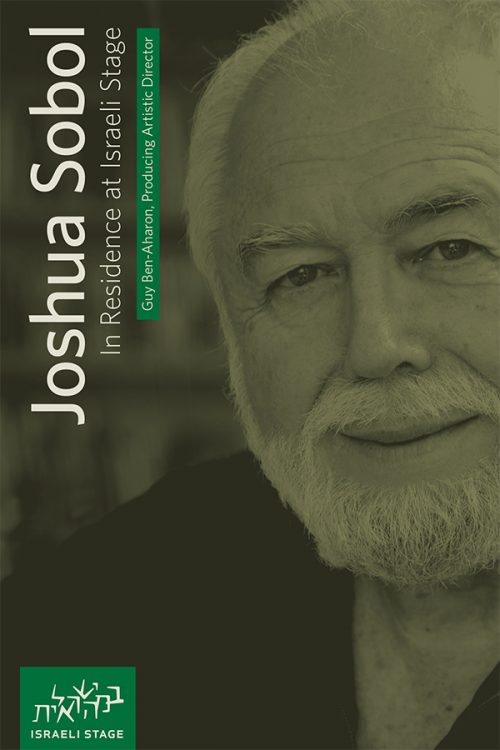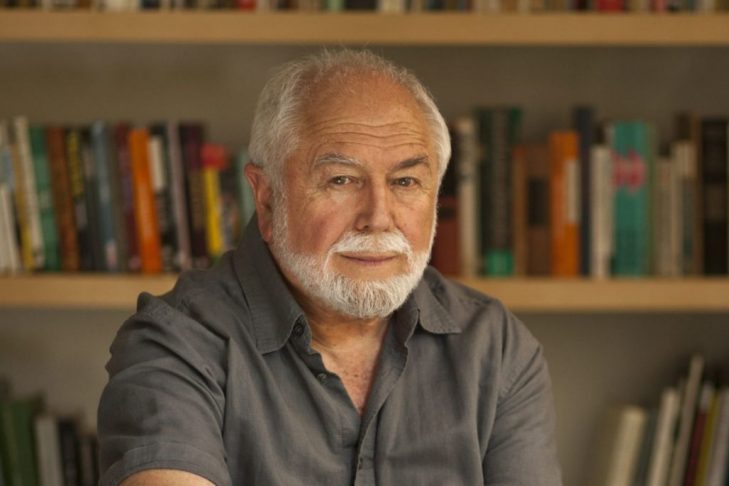Israeli playwright Joshua Sobol’s residency—under the auspices of Boston’s Israeli Stage and supported with a grant from CJP—will mark the U.S. debut reading of Sobol’s new play, “David, King.” Sobol will also deliver talks in various venues on the topic of “Theatre as a Form of Resistance to Oppression,” bringing in examples from his many plays. And his thought-provoking 2008 play “Sinners” will run at the New Repertory Theatre from March 23 to April 2. Sobol will be in conversation with cultural critic Ed Siegel of WBUR’s “The Artery” after the Sunday, March 26, performance.
Israeli Stage’s founder and producing artistic director Guy Ben-Aharon observed of Sobol: “He has been dealing with how theater can be a form for resistance for over five decades within the Israeli landscape. By engaging with Sobol and his work in Israel, you will gain a new perspective on your experience in Boston, on your experience as an American, or as someone living in the U.S.”
The 77-year-old playwright recently spoke to JewishBoston from Israel about his politically charged and historically imbued plays. He had just come from a rehearsal of “The Merchant of Venice,” which he’s directing in Haifa. “Shakespeare,” he said, “is the dramatist that has most influenced me. He’s very contemporary. I’ve directed the play before at the Illinois Shakespeare Festival in 2002. My interpretation then was that it takes place in 1938 when Italian fascism degenerated into a very virulent and aggressive form. So the play is about fascism and anti-Semitism.”
In this newest presentation of Shakespeare’s play, Sobol says he has related it to contemporary Israeli politics. “We have a right-wing government passing laws that shouldn’t be voted on in the Knesset, the Israeli parliament,” Sobol noted. “For example, the Knesset recently passed a law about the confiscation of private Palestinian land to build settlements. I hope our Supreme Court will nullify that law.”
Echoes of Shakespeare can be heard in “David, King” as well. Sobol has incorporated the Shakespearian premise of “uneasy lies the head that wears a crown” and made it his own. This quote from “Henry IV, Part 2” is eerily applicable to Sobol’s depiction of King David, who does not want to be king. “He wants to get rid of the crown,” said Sobol. “The play is really about an artist who is forced to be king. At the end of the day all he wanted to do was to play his music.”

Although Sobol has been frequently regarded as a writer of thesis plays—works that promote certain political or moral arguments—he resists the label. “Everything in Israel is political,” he said. “You cannot ignore the politics.” For Sobol, political discourse, particularly the Israeli-Palestinian conflict, drives much of his work. His 1985 play “The Palestinian Girl” tells the tragic love story between a Palestinian actress and a right-wing Israeli. Sobol said at the time the use of “Palestinian” in the title was virtually taboo in Israel. “I think the play brought the word ‘Palestinian’ into our public discourse,” he said. “The world has finally accepted the word and the fact that there are Palestinians next to us.”
The Israeli-Palestinian conflict casts a shadow over much of Sobol’s work. In his play “Jerusalem Syndrome,” Sobol imagines a modern-day Armageddon ignited by right-wing fanaticism. The play’s historical underpinnings call up the revolt of the Jews against the Romans during the time of the Second Temple in 70 A.D. In Sobol’s rendition, the destructiveness of the wars that Josephus vividly chronicled is now the modern-day version of a fanaticism that will destroy the young state of Israel.
The title, “Jerusalem Syndrome”—a psychiatric term used to describe foreigners who come to Jerusalem and are overcome by messianic delusions—adds another layer of meaning. Sobol said his adoption of the term “makes it clear that fanaticism is liable to cause a third destruction. The play warns against such behavior. When the play opened in 1988 it coincided with Israel’s 40th anniversary and the beginning of the First Intifada. Right-wing fanatics started a row in the theater during the premiere.”
“Sinners” extends Sobol’s preoccupation with human rights to women in Iran and throughout the Middle East. The play is unsettling, the setting dark and minimalist. Layla, a married professor of English, is buried up to her waist in scorching desert sand. She is about to be stoned for adultery. Sobol asserted that the play gives voice to victims who otherwise have no voice. “Rather than a play about politics, it is a play about the joys and perils of our humanity,” he has said in interviews.
Sobol’s hopes for peace in Israel are intertwined with the question of, “Should we make concessions for peace, or are we strong enough to survive without peace? I don’t think we are. We cannot go on living forever in a state of war with our neighbors. We have to accept the existence of the other and recognize the needs of the other. This is the message in many of my plays. Maybe that has political meaning, but that was not my primary intention.”
Find more information on Sobol’s residency in Boston here.
This post has been contributed by a third party. The opinions, facts and any media content are presented solely by the author, and JewishBoston assumes no responsibility for them. Want to add your voice to the conversation? Publish your own post here. MORE









